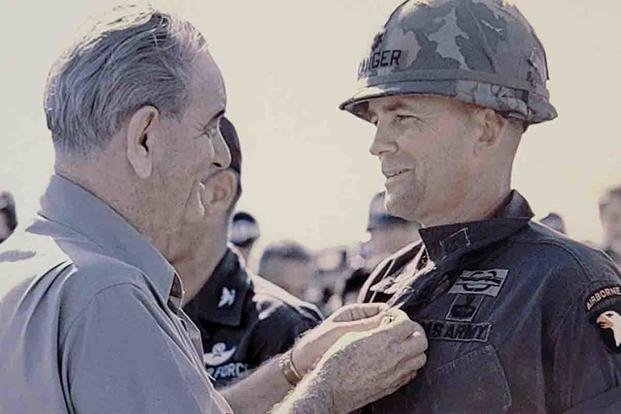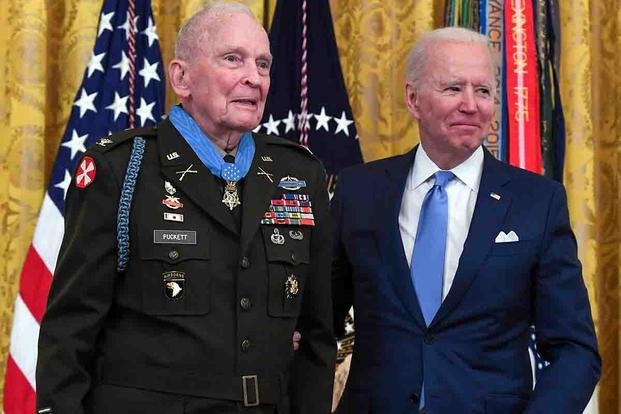When Ralph Puckett was chosen to lead a new Ranger company in 1950, he said a prayer: "Dear God, don't let me get a bunch of guys -- good guys -- killed."
In late November 1950, the then-Army lieutenant was leading the 8th Ranger Company in a daring assault against entrenched North Korean machine guns near the town of Unsan. His extraordinary heroics allowed the Rangers to overwhelm the positions. After a powerful, hourslong counterattack, they faced being overrun themselves. Puckett was wounded and boldly told his men to leave him behind, an order they refused. Instead, they dragged him off the hill to safety, saving his life and ensuring he would not only survive the war, but fight again another day.
For his decisive and brave leadership fighting North Korean troops, he received the Distinguished Service Cross. Some 71 years later, that award was upgraded to the Medal of Honor, and now-retired Col. Ralph Puckett was still alive to receive the medal from President Joe Biden in a May 2021 White House ceremony.
On Nov. 29, 2022, Hiroshi Miyamura died, leaving Puckett the last surviving Medal of Honor recipient of the Korean War. Puckett died in his sleep on April 8, 2024. He was 97 years old.
Born in Tifton, Georgia, in 1926, Puckett attended a military high school before enrolling at Georgia Tech in 1943 at just 16 years old. He joined the Army Enlisted Reserves soon after and he attempted to get a pilot's position in the Army Air Forces, but with World War II winding down, he was discharged instead. Despite this, the young man persisted and got into the U.S. Military Academy at West Point, becoming a cadet in 1945 and graduating in 1949. Instead of being a pilot, his destiny (or so it appeared) was to become a Ranger.
On June 25, 1950, North Korea suddenly invaded American-backed South Korea. U.S. forces, unprepared for the assault, mounted what defense they could but were nearly pushed into the sea by the North Korean onslaught. They made their stand in a perimeter around the city of Pusan (today Busan), and held the ground until additional United Nations troops could intervene. Lt. Puckett, with no combat experience, was placed in command of the newly formed 8th Ranger Company in Japan and sent to Pusan.
For seven weeks, the Rangers trained against live North Korean infiltrators. On Sept. 10, 1950, Gen. Douglas MacArthur directed a massive amphibious invasion on the Korean peninsula behind the Pusan Perimeter, and within three weeks, the 8th Ranger Company were part of the breakout of the perimeter, pushing the North Koreans back across the 38th Parallel. From there, Puckett spearheaded the invasion of the north.
"Korea is sometimes called the 'Forgotten War,'" as Biden said at Puckett's Medal of Honor ceremony. "But those men who were there under Lieutenant Puckett's command -- they'll never forget his bravery. They never forget that he was right by their side throughout every minute of it."
On Nov. 23, while Americans back home and fighting in Korea were enjoying Thanksgiving dinners, Puckett and the Rangers were scouting in advance of the coming American push toward the Yalu River, North Korea's border with China. Two days later and five months to the day since the war began, the Rangers began an advance to Hill 205, near the North Korean city of Unsan. They came under heavy fire from mortars and small arms, but Puckett led his company over 800 yards of open terrain to capture the position. He exposed himself to enemy machine guns so his men could see where they were placed and subsequently take them out. He then began to fortify his position on the hill. He would need every minute of preparation.

Just a month before the 8th Rangers took Hill 205, communist China intervened in the war, sending 300,000 troops to aid North Korea. The invasion pushed the U.S. advance back south toward the 38th Parallel. The combined communist forces captured Unsan on Nov. 4, and Puckett's men were dangerously outnumbered. By 10 p.m. local time on Nov. 25, the Rangers were under a heavy assault. Puckett was wounded but still directing artillery fire into the early hours of the next day. At 3 a.m. he was wounded by mortar fire that rendered him immobile. Without artillery support, he ordered his men to withdraw without him.
In ignoring Puckett's order, the Rangers at Hill 205 saved their commander, but also one of the most important Rangers in Army history. Puckett became a Ranger instructor and commander of the Mountain Ranger Division, an adviser to Colombia's Rangers and commanded the 10th Special Forces Group in Germany during the Cold War, leading covert insertions by land, sea and air.
"Colonel Puckett is a true hero of the Korean War," South Korean President Moon Jae-in said during Puckett's Medal of Honor ceremony, which marked the first time a South Korean president had been present for such an award.
"With extraordinary valor and leadership, he completed missions until the very end, defending Hill 205 and fighting many more battles requiring equal valiance," Moon added. "Without the sacrifice of veterans, including Colonel Puckett and the Eighth Army Ranger Company, [the] freedom and democracy we enjoy today couldn't have blossomed in Korea."
Puckett would answer his country's call once more in 1967, this time deploying to South Vietnam with the 101st Airborne Division as a lieutenant colonel. On Aug. 13, 1967, his airborne infantry battalion engaged a battalion of Viet Cong near Duc Pho. Puckett crossed a minefield to direct his soldiers and rally them. Throughout the night, he coordinated the fighting from a foxhole under heavy fire, refused to be extracted and even tended to the wounded.

Veterans of that battle said his mere presence stiffened the American resistance during the battle, which they eventually won. Puckett received another Distinguished Service Cross for that engagement and would eventually receive two Silver Stars, three Legions of Merit, five Purple Hearts and two Bronze Star Medals with V devices for valor, making him one of the most decorated soldiers in Army history.
Puckett would leave the Army in 1971 and continue serving his country as national programs coordinator of Outward Bound, a nonprofit with the mission of exposing students, especially those from inner cities, to wilderness areas. When the Ranger Hall of Fame was established in 1992, Col. Ralph Puckett was one of the inaugural inductees.
To learn more about the extraordinary life and career of Ralph Puckett, check out his 2017 book, "Ranger: A Soldier's Life."
Want to Learn More About Military Life?
Whether you're thinking of joining the military, looking for post-military careers or keeping up with military life and benefits, Military.com has you covered. Subscribe to Military.com to have military news, updates and resources delivered directly to your inbox.
















